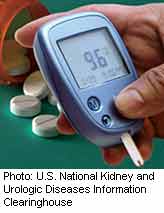
FRIDAY, June 8 (HealthDay News) — People with higher-than-normal blood sugar levels — or prediabetes — may be at greater risk for having a stroke later in life, according to a new review.
Researchers from the University of California warned that this could represent a large-scale health problem, with prediabetes affecting 79 million people in the United States alone.
The study was published online June 7 in the BMJ.
Examining 15 previous studies involving more than 760,000 people, the researchers found that people with prediabetes had a 21 percent higher risk of stroke, according to a journal news release.
Whether a greater risk really exists, however, depended on how prediabetes was measured.
Previously, prediabetes was defined as having a blood sugar (or blood glucose) level of 110 to 125 milligrams per deciliter (mg/dl) following a 12-hour fast.
This definition of prediabetes was set in 1997 by the American Diabetes Association. In 2003, however, the association revised the guidelines to include people with a fasting glucose of 100 to 125mg/dl. Based on this lower limit, the researchers found no increased risk for stroke.
The study authors argued there may be a “threshold effect” and that the risk for stroke may increase at or above a fasting glucose level of 110mg/dl. They noted that the quality of evidence was variable and that other factors also may come into play.
They concluded that people with prediabetes or a fasting glucose level of 110 to 125mg/dl had a “modestly higher risk of future stroke,” and that people with this condition should keep their weight under control and adopt a healthier lifestyle to reduce the risk.
In an accompanying journal editorial, Jonathan Treadwell, a senior research analyst with the ECRI Institute, a nonprofit patient-care research organization, said the researchers used a simplified classification of prediabetes, and that it’s impossible to know the exact scope of the potential association between prediabetes and stroke.
More information
The U.S. National Diabetes Information Clearinghouse has additional information on pre-diabetes and stroke.

